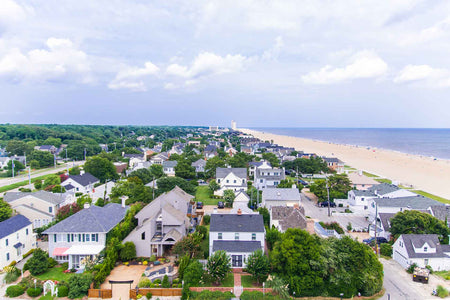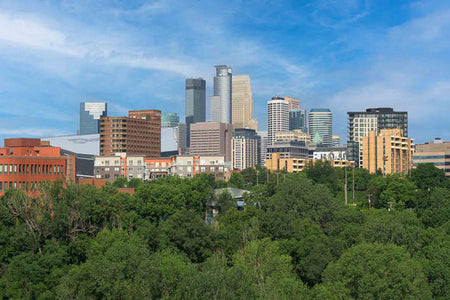- Allergy season in Florida varies by region, and Spring and fall are generally the most challenging times for allergies.
- The most common allergens in Florida include oak, pine, cypress, Bermuda grass, Bahia grass, ragweed, mold, and dust mites.
- To prepare for Florida allergy season, keep an eye on local pollen levels and start allergy medications early for proactive management.
Florida is a favorite destination for visitors throughout the year, thanks to its sunny weather, warm temperatures, and beautiful scenery. While it offers a perfect setting for outdoor adventures, it’s also known for seasonal allergens that can catch many people off guard.
Many people can be affected by the high pollen levels of Florida’s diverse plants and trees. The best way to prepare for Florida allergy season is to know when these allergens are most prevalent, along with strategies to reduce your exposure and manage your symptoms.
When is Allergy Season in Florida?
Allergy season in Florida varies slightly by region, and there are different peak times for tree, grass, and weed pollen.
When is Allergy Season in North Florida?
In North Florida, tree pollen starts as early as January and peaks in spring, primarily because of oak and pine trees. Grass pollen emerges from April to September, which peaks during the summer months. Weed pollen dominates from August to November, with ragweed being prevalent in the fall.
When is Allergy Season in Central Florida?
Central Florida experiences a similar pattern, with tree pollen peaking from late January through May. Grass pollen is present almost year-round from April to October, and its peak levels occur in the summer months. Weed pollen, particularly ragweed, peaks in the fall from August through early December.
When is Allergy Season in South Florida?
In South Florida, the warm climate results in a nearly year-round allergy season [*]. Tree pollen is prevalent year-round, but peaks between February and May. Grass pollen also persists nearly year-round, with the highest levels in summer. Weed pollen peaks from August to December as fall approaches. Because of its longer growing season, South Florida experiences a longer allergy season than the northern regions.
What are the Worst Months for Allergies in Florida?
The worst months for allergies in Florida vary by pollen type, but spring and fall are the most challenging seasons. Here are more details:
- Spring (February to May). Tree pollen is at its peak during this time, especially in March and April. Oak, pine, and cypress pollen are common allergens that cause symptoms for many. Bluejack Oaks (Quercus incana), which are part of the oak family and are common in the central and northern areas, produce a substantial amount of pollen during the spring [*].
- Summer (April to September). As spring transitions into summer, grass pollen becomes the primary allergen. Peak levels occur in the warmer summer months, especially in June and July. Common grasses that produce pollen in Florida include Bermuda grass, Timothy grass, and Johnson grass.
- Fall (August to November). Fall brings an uptick in weed pollen, particularly from ragweed. This season becomes more challenging for people living with allergy. September and October are often the worst months for fall allergies. Among the different ragweed, short ragweed is the most allergenic [*].
Allergy peak times can differ depending on the region in Florida. In South Florida, residents often deal with allergies nearly all year round, while North and Central Florida experience more distinct seasonal peaks.
When Does Allergy Season End in Florida?
Allergy season in Florida tapers off in late fall or early winter, but this varies by region.
In North Florida, allergy season typically ends around November as weed pollen levels decline. Central Florida experiences a slightly extended season, as pollen persists into early December, particularly for weeds. In South Florida, the warmer climate allows for nearly year-round pollen, but levels usually decrease by late December.
Although pollen is present most of the year in Florida, it drops significantly during winter months, especially in North and Central regions. South Florida may still have lingering pollen, though at lower levels.
Common Allergens in Florida
Here are some of the most common allergens found across Florida:
- Oak
- Pine
- Cypress
- Bermuda
- Bahia
- Ragweed
- Mold (found in homes and buildings with poor ventilation)
- Dust mites
How to Prepare for Florida Allergy Season
While it may not be possible to completely avoid Florida allergens, you can take measures to minimize their impact. Here are some ways to prepare for Florida allergy season:
- Check local pollen forecasts regularly to know when levels are high.
- Try to stay indoors on days with high pollen counts, especially in the mornings when pollen is most active.
- Start taking allergy medications before allergy season to build up protection against allergens. As an alternative, incorporate Allermi nasal spray — it’s designed to target multiple nasal allergy symptoms for quick relief.
- Use an air purifier with a HEPA filter to reduce indoor allergens.
- Keep windows closed during peak pollen times and use air conditioning instead.
- Clean and vacuum regularly, especially during high-pollen months, to reduce dust mites and pet dander (common indoor allergens).
- After spending time outdoors, shower and change clothes to remove pollen from your skin and hair.
- Wash bedding frequently to remove pollen that may have settled.
- Wear sunglasses and a hat to reduce pollen exposure to your eyes and hair (which can then transfer to your face and eyes).
- Wear a mask when doing yard work or spending extended time outside during peak allergy season.
Implementing these strategies will help lessen the effects of seasonal allergies, allowing you to fully enjoy Florida’s outdoor experiences.
The Bottom Line
Dealing with allergy season in Florida can be tricky, but by implementing effective strategies and preparations, you can lessen the effects of allergens on your everyday life.
For effective relief, consider incorporating Allermi nasal spray into your allergy management routine. Formulated with active ingredients like an antihistamine, decongestant, and anti-inflammatory, Allermi can help you breathe easier and enjoy all that Florida has to offer.
References:
- Singh, A. B., & Kumar, P. (2022). Climate change and allergic diseases: An overview. Frontiers in Allergy, 3. https://doi.org/10.3389/falgy.2022.964987
- Ashley, M. V. (2021). Answers Blowing in the Wind: A Quarter Century of Genetic Studies of Pollination in Oaks. Forests, 12(5), 575. https://doi.org/10.3390/f12050575
- ScienceDirect. (n.d.). Ragweed pollen. In Topics in medicine and dentistry. Retrieved October 4, 2024, from https://www.sciencedirect.com/topics/medicine-and-dentistry/ragweed-pollen









